'Everyone can think of a favorite teacher': Here's what drives top teacher in Monmouth
On the first day of school in 2019, an eighth grader at Red Bank Middle School marched up to language arts and special education teacher Alyssa Geary and delivered a pronouncement.
“He said, “I’m not going to read anything in your class this year,’” Geary recalled. “I said, ‘OK that’s fine, but I think you might.’ He said, ‘No way.’”
Geary didn’t push it. The student endured some past childhood trauma and had a reputation for difficult behavior. “I didn’t get mad at him, tell him, ‘You’re going to fail my class,’” Geary said.
She let the books do the convincing for her.
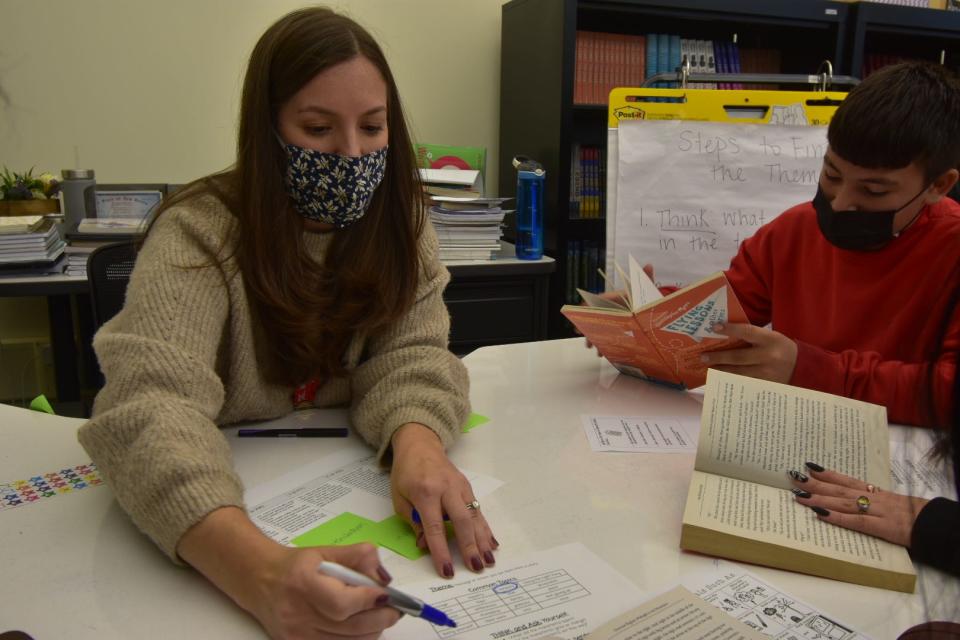
How her school influenced her: Nobel Peace Prize winner Maria Ressa inducted into Toms River Schools Hall of Fame
“We started our realistic fiction unit and he started to like some of the short stories we were reading,” Geary said. “He went to the back shelf and found ‘Wonder’ by R.J. Palacio.”
Wonder is the story of a 10-year-old boy with facial deformities who was homeschooled until fifth grade, when he attends a private school and confronts social challenges.
“After two days he handed the book back to me and said, ‘This is the most beautiful thing I’ve ever experienced,’” Geary said. “Those were his words.”
He read another book after that. Then another. By the spring, the non-reader had become an avid reader.
“As a teacher, that is the ultimate joy,” Geary said.
Alyssa Geary is the 2021-2022 Monmouth County Teacher of the Year as chosen by the state Department of Education. She’s been in the classroom for 12 years, the past seven at Red Bank Middle School. As the school year winds down, the Asbury Park Press engaged her in a conversation about the state of teaching. The profession has faced unprecedented headwinds, from the pandemic and virtual learning to a surge in book banning and school shootings.
G&G Hot Dogs: Building the American dream in Red Bank, one hot dog at a time
Here is our Q&A, edited for clarity and brevity.
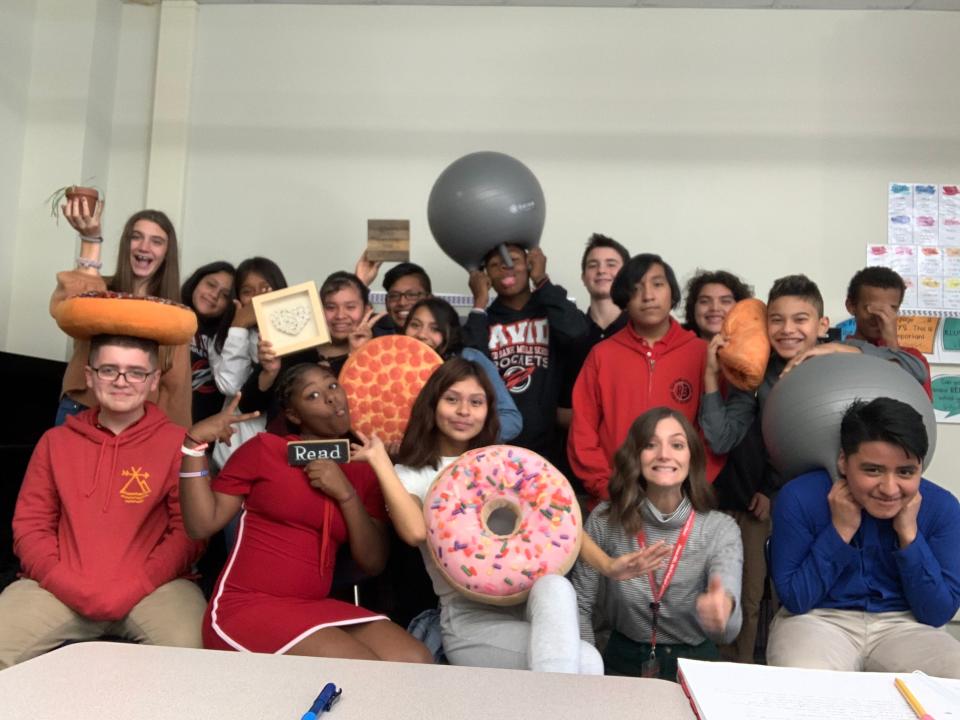
Q. What are the biggest challenges teachers face in 2022?
A. “I think burnout is one of the biggest challenges. There’s a great deal of work completed outside of contractual hours due to necessity and daily demands. The stress and the job pressure, and at times the feeling of salary and general support not aligning with our value, with what teachers invest and contribute. All of that contributes to teacher retention being an issue.”
Q. How much has the pandemic contributed to burnout?
A. “The pandemic exacerbated issues that were already present. There was a tremendous shift that happened. We had to transition to figure out technology that would work to be engaging and effective. That was added to what was already there — the stress of being worried about your health, the health of your family, your students, your students’ families. All of that created a perfect storm.”
Q. What can the public do to ease burnout?
A. “As a community, just acknowledging teachers are professionals. There’s a lot of weight that goes into our day-to-day decisions. We’re not making choices on curriculum or how we address students’ needs whimsically. Just have a little bit of faith in the fact that we are professionals and we do take our jobs seriously, and we’re ensuing our students’ best interest comes first.”
How to find help: COVID didn't just kill in NJ, it challenged our mental health
Q. How important is developing relationships with the students you teach and how do you go about doing that?
A. “The most important thing is human-to-human connection. The relationships we build with our students create motivation. They actually build neural pathways for learning in our brain and improve student behavior. Relationships are what fuel our why and our purposes for being in the profession.
“How do we do that? Making sure your positive interactions outweigh your negative. At least for myself, making sure I praise effort over outcomes. It’s not just, ‘Hey, you got an A, you’re doing awesome.’ A C might have been very hard earned.
“Simply getting to know what students like and dislike, knowing their cultures and backgrounds, that definitely helps leverage your ability to connect.
“They also need to see you cooperating with other adults. They need to see you empathizing with people. They need to see you having patience. If you want to see students have those qualities, you need to be able to model that yourself.”
Q. How hard was virtual teaching?
A. “It definitely changed my perspective on teaching. There are so many things we do as teachers when we’re face to face that are nuanced that are not translated, or not translated easily, through a computer screen.”
Q. During virtual teaching, you didn’t require students to have their video on. Why not?
A. “A lot of students were hesitant to show sides of themselves that they didn’t necessarily have to show when we’re physically in the classroom. In my district, the primary school kids were ready to be on screen. Middle school is different. So much of their self-perception is determined by how their peers view them. So to have their face on camera while learning, sometimes I feel that helped elevate their angst. So I didn’t require it. I wanted to alleviate any stressors; I didn’t want to increase them. I had other ways to checking in with them (to make sure they were OK and staying on track).”
Helping kids left behind: NJ schools focus on figuring out how to fix COVID learning loss
Q. How much learning and/or socialization was lost in that first COVID year?
A. “There is so much emotional growth that happens from sixth to eighth grade in the way they learn to interact with each other, and with adults. A lot of that was lost. It really is such an individual thing. Some students thrived in the virtual environment, some faltered, some remained the same. There were gaps in the curriculum, but I found there were more gaps in social and soft skills — how to open a locker, how to interact with people in the cafeteria.”
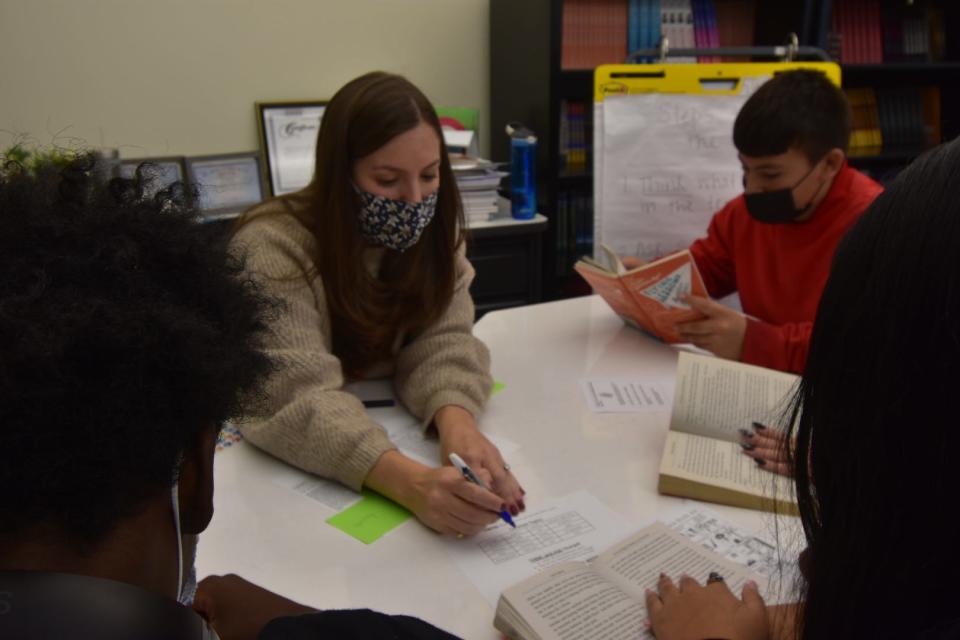
Q. Last year, before the vaccine was available, was it nerve-wracking to walk into a classroom during the pandemic, even at reduced capacity?
A. “It was definitely unnerving before the vaccine. Our administration worked really hard to make sure safety was in place. We understood the importance of being there in person because nothing can replace the human-to-human connection, but there definitely was a level of fear as well.”
Q. What kind of toll have the past two years taken on teachers’ mental health?
A. “There’s a push for self-care and that’s certainly important, but I think it’s also important for administrators and principals to be tuned in and to make certain parts of the position less burdensome. You definitely need a partnership with your administration, where you feel comfortable expressing what’s working and what’s not working. I feel grateful that I have a great administrative team behind me that listens to and values teacher input."
Mask fights and getting called Nazis: Why would anyone want to run for school board?
Q. We’ve reported on confrontations between parents and school board members over the past year. In your experience, what kind of changes did the pandemic cause in the parent-teacher dynamic?
A. “We have a wonderful community that rallied behind what we were doing and trusted our efforts. I feel like I contacted parents way more frequently the past two years than I had previously. Sometimes parents would come to class (online) with their child. There were opportunities that opened the door for our community. We have a lot of parents who work more than one job and are often unable to attend certain school functions like parent-teacher conferences or back-to-school nights. We actually had greater attendance over the past couple of years when we opened these things to be virtual.
“Some of the practices, we’re going to continue. We’ve had discussion this year about parent-teacher conferences being in person or virtual (in 2022-23), depending on what a parent would prefer.”
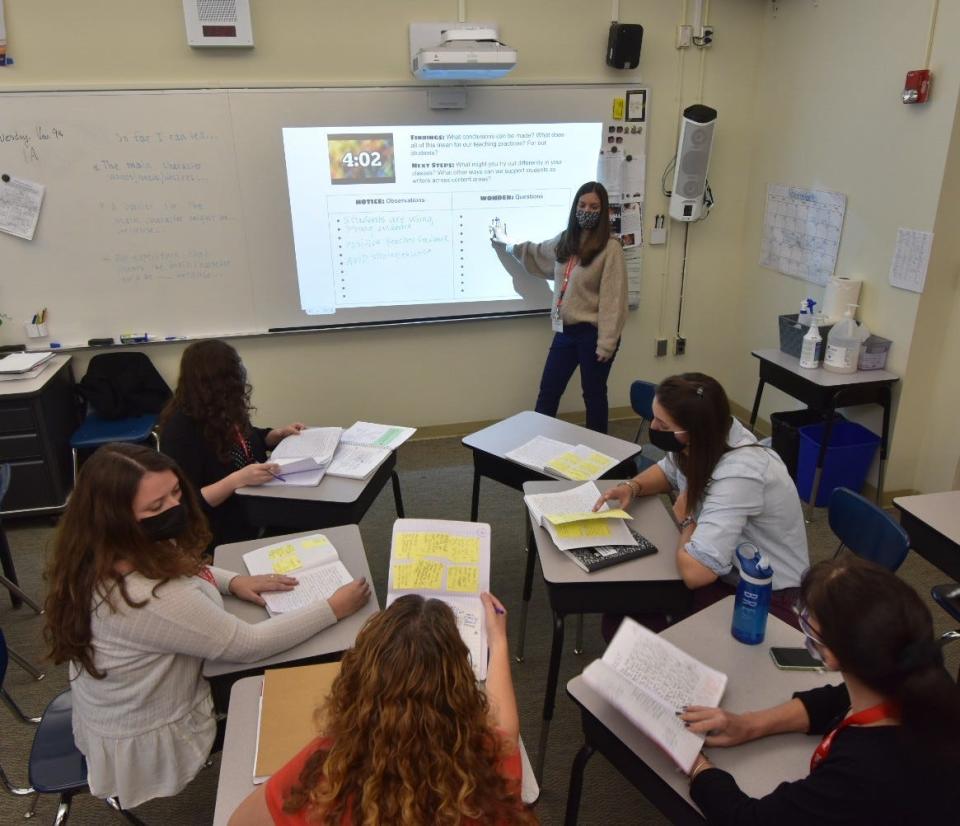
Q. There has been a movement in some parts of the country to censor or ban some books from being in school libraries. How do you respond to that as an educator?
A. “Very passionately. We haven’t been immune. There have been requests by parents, they don’t want their child reading particular books in class.
“If we’re reading realistic fiction, students have tons of realistic fiction books on our shelves, so they can get themselves acclimated with a subject that fits their interest. The science on this is if you’re building readers, their skill set improves if they’re connecting with what they’re reading.
“It’s sad when books become banned. I can respect when a particular parent has a problem with something their child is reading, and I will always respect that. I strongly believe a student should be able to find themselves in the characters in the books they are reading, and the books we put on our shelves speak to that. We have texts written from people of diverse backgrounds on diverse topics for that purpose. I also think it’s important for students to see and experience things that they wouldn’t necessarily experience otherwise.”
Q. Like the student who told you he wouldn’t read anything.
A. “There were tons of options for him to dig into. If you don’t create those spaces for kids to find themselves in books or experience connections, you are setting them up for failure.
“Life is super messy and it doesn’t have pretty pictures and happy endings all the time. Having literature that taps into pieces that are not perfect is important for kids to start thinking critically, problem-solving, and developing empathy for others.”
Q. What’s it like to walk into a classroom right after news of a school shooting, like in Newtown, Parkland or Uvalde?
A. “We are given permission from our administration to talk with students about situations like these. We’ve had trauma-informed professional development. These are clearly controversial conversations for even adults to be having, so to navigate that with children needs to be done with care and purpose. At least for me, it’s helpful having those conversations rooted in some sort of fact. Being able to provide students with an article or news clip that has been vetted and is accessible (for that age group) becomes helpful. We definitely don’t leave the elephant in the room and walk around it. We work to have meaningful discussions.”
Q. What is an active-shooter lockdown drill like, to be huddling in a corner in silence?
A. “First and foremost the safety of our students has to be present and has to be felt. It takes a toll on our students. In the middle of what could be an awesome learning experience, there’s an announcement on the PA system for a lockdown drill. You get interrupted and you start thinking about all the things in the news. But these things have to be in place. Being prepared is important.”
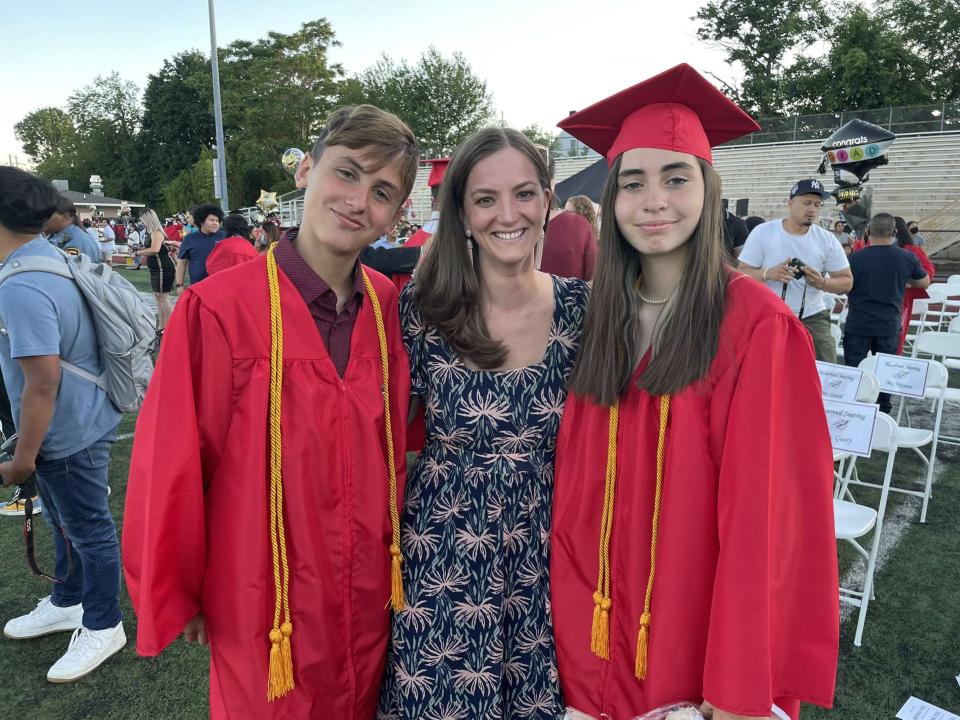
Q. What do you love most about teaching?
A. “My students, they are an absolute joy. It’s awesome to watch them interact with each other. They have such pride in their community and with who they want to be, and that’s super motivating as a teacher, to be able to tap into that. They’ve got great energy and so much possibility.”
Q. What is your biggest piece of advice for a new teacher or someone studying to become a teacher?
A. “Find your people. Teaching can become very isolating if you stay focused on just your classroom. It’s super important to find those connections with your colleagues and to reach out and ask for help when you need it. You don’t have to sit in the challenge or the problem yourself. There are so many teachers who are willing to mentor or coach or guide. There is so much camaraderie in the profession.”
Q. What would your “elevator pitch” be to someone who is thinking about becoming a teacher but not sure? Why should they do it?
A. “I think it’s the greatest profession. There is no other profession where you are able to impact so many lives so powerfully. Everyone can think of a favorite teacher. It’s been said that each teacher impacts about 3,000 lives in your career. That’s tremendous. Think about what you are giving back to your community, to individuals. That’s why I am in it.”
Jerry Carino is community columnist for the Asbury Park Press, focusing on the Jersey Shore’s interesting people, inspiring stories and pressing issues. Contact him at jcarino@gannettnj.com.
This article originally appeared on Asbury Park Press: Monmouth Teacher of Year is Alyssa Geary, Red Bank Middle School

